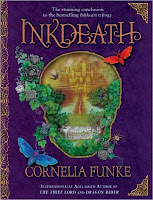This month, I chose to re-read
The Westing Game
by Ellen Raskin for my monthly Childhood Challenge read.
In the sixth grade, my reading class was split into “lit groups”, and each group was assigned a different book to read. This was a pretty normal practice, one I had gone through since the fourth grade. But in the fall of my sixth grade year, I had an experience I wasn’t used to: My lit group had gotten a book that I had no interest in reading. As an avid reader at a young age, I tended to get excited about reading any new book. But that fall, I fell a little on the inside when I watched as my teacher pulled out the stack of books for my group, and I read the title displayed on the covers of those books:
A Day No Pigs Would Die
. I thought the title sounded horrifying, and as I read the back of the book, I prepared myself for the worst reading experience I could imagine.
As I sat with my head lowered, wishing I had been put in any other group besides the one I was stuck in, my teacher graced me with a way out when she announced, “The book
A Day No Pigs Would Die has cuss words in it. If you’re offended by bad language, you may request to be put with another group.” My inner me shouted, “Hallelujah!” After class, I discreetly pulled my teacher aside and informed her that I felt strongly about bad language and couldn’t bring myself to read a book with such language in it. In reality, I just didn’t want to read a book whose opening chapters were about a pig being slaughtered.
My teacher trusted me (possibly a little too much), and so she gave me an even bigger gift than simply getting out of reading a book I didn’t want: She let me choose any of the other four books that had been assigned to lit groups. After looking through the titles, I settled on a book called
The Westing Game by Ellen Raskin.
(Disclaimer: As an adult, I read
A Day No Pigs Would Die. While I agree it is a memorable book for more than just its pig-slaughtering scenes, the sixth-grade me would not have appreciated the book.)
For the first assigned reading, I needed to read the first three chapters. I went home, opened the book and started reading, fully intending to stop at the beginning of the fourth chapter. But I got so engrossed in the story that I didn’t even notice the fourth chapter as it came and went. I read and read … and read. I finished the first 13 chapters before getting too tired to continue reading. The next day, I finished the book and then promptly went back to page 1 and started over again. I remember thinking, “This is my new favorite book!” I liked it so much I went out and got my own copy.
I used to regularly re-read
The Westing Game—so much so that edges of the pages got softened by the number of times I turned those pages. But I hadn’t picked up the book in nearly a decade when I reached for it the other night and pulled it down from my shelves. I started reading, only thinking I would read a few chapters at a time, and found myself re-drawn into the story all over again. I couldn’t put it down, and once again, I finished the book wanting to turn back to page 1 and start it again. For me,
The Westing Game is like a favorite song—I can listen to the same song on repeat ten times in a row and still want to hear it again. I can read
The Westing Game over and over again and still want to read it again.
When I was younger, I think the thought of living in an apartment building appealed to me, so the setting was exotic for me even though it was set in Wisconsin. The characters are also real, yet fascinating in their realness. I think everyone, at one time or another, has a little of each character in them. I especially liked the Wexler family: Grace, who thought too much of what society said/thought about her; Turtle, who so badly wanted to get attention that she lashed out and became the shin-kicking brat; Angela, the saintly daughter who wanted to find out how much of her was just listening to her mother and how much of her was really her; Jake, who couldn’t seem to figure out where he belonged. My favorite character was Turtle, and although I never adopted her methods of kicking shins, I wanted to be like her.
Re-reading it for the umpteenth time didn’t disappoint—the characters were waiting for me like old friends who never tire of my reading company, and the story read like a familiar yet captivating tale. A couple of my favorite quotes that show Ellen Raskin's lighthearted and quippy writing style throughout the book are these:
Sydelle Pulaski’s eyes popped open in surprise. Quickly she sqeezed them shut and uttered another loud snore. Well, what do you know? Her sweet, saintly partner was the bomber. Good for her! (100)
All of a sudden he was leaving Sunset Towers, pushed by his limping partner. Maybe Doctor Deere is not who and what he says he is. Maybe he is being kidnapped for ransom. Maybe he’s being held hostage. Oh boy, he hasn’t had so much fun in years. (113)
Of all the books I’ve read in my reading career, this one stands out as the most special because it set the feeling inside me that I would soon begin to recognize as my own ‘joie de lire.’ I highly recommend it for readers of all ages.
What books give you that feeling of 'joie de lire'?
Happy reading!










